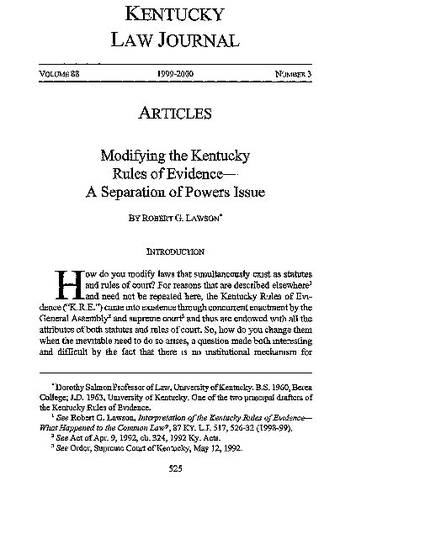
How do you modify laws that simultaneously exist as statutes and rules of court? For reasons that are described elsewhere and need not be repeated here, the Kentucky Rules of Evidence (K.R.E.) came into existence through concurrent enactment by the General Assembly and Kentucky Supreme Court and thus are endowed with all the attributes of both statutes and rules of court. So, how do you change them when the inevitable need to do so arises, a question made both interesting and difficult by the fact that there is no institutional mechanism for concurrent lawmaking by the General Assembly and supreme court, at least not in Kentucky.
Major problems involving amendment of the Rules have not yet surfaced. There has been no substantial modification of the Rules since their enactment, although some is needed, and no resolution of fundamental questions concerning amendment by the Kentucky Supreme Court. There have been some peripheral observations in the case law about the amendment provisions of the Rules but no major consideration of the important ramifications of Rule 1102 (the amendment provision), although crucial issues concerning amendment loom large on the horizon. It is the purpose of this Article to identify and discuss these issues and shed some needed light on the amendment provisions of the Rules, all with an eye on the fundamental question of whether the creation of evidence law is a legislative or judicial function.
Part I sets the stage for subsequent discussion by describing the basics of amendment under Rule 1102, what the Kentucky Supreme Court has said on the subject to date, and the issues that need attention and analysis. Part II examines the fundamentals of judicial rulemaking generally and under Kentucky law. Part III discusses the meaning of "substance" and "procedure," concepts that are used in Kentucky and elsewhere to define the rulemaking authority of the judiciary, with special attention given to the Federal Rules Enabling Act—the richest source of guidance on the subject—and to the commentary of legal scholars on general rulemaking authorities. Part IV extends the substance/procedure analysis to evidence law and attempts a classification of the Kentucky Rules of Evidence as "substance" and "procedure" for rulemaking (and amendment) purposes.

Kentucky Law Journal, Vol. 88, No. 3 (1999-2000), pp. 525-589